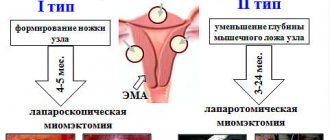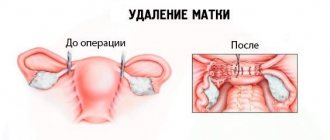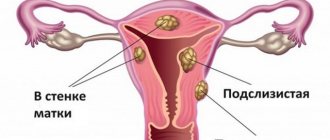Hysterectomy is directly related to one of the most complex and responsible operations.
In some cases, only this surgical intervention can help save a woman not only health, but also life.
Of course, this operation causes certain changes in the functionality of the entire female body, and menstruation after removal of the uterus often frightens patients and forces them to consult a gynecologist.
Indications for the operation are:
- malignant neoplasms;
- prolapse or prolapse of the uterus;
- severe form of endometriosis;
- ectopic pregnancy;
- multiple fibroids.
The decision on the need to remove the reproductive organ (uterus) is made by a qualified gynecologist after a detailed examination and the absence of positive results from long-term treatment.
Of course, all patients who have had to deal with this problem are ready for the upcoming menopause, and the appearance of spotting can cause not only fear, but even real panic.
The operation itself is quite complicated, but the recovery period requires not only physical, but also moral strength from the patient.
It is important to remember that any surgical operation entails many changes, since it is an intervention in the functioning of the body, and the procedure described is no exception.
Hysterectomy is an operation during which the amputation of a woman’s reproductive organ is performed, but depending on the characteristics of each individual case, the following can be removed during surgery:
- both ovaries and fallopian tubes;
- one ovary and one fallopian tube;
- Cervix.
The consequences of surgery also depend on what kind of operation was performed on the patient. Amputation is the supravaginal removal of the reproductive organ, in which the cervix, fallopian tubes, and ovaries are preserved. Extirpation – removal of the uterus, cervix, appendages. Subtotal hysterectomy – removal of a separate section of the uterine body (indication is fibroids).
Radical hysterectomy is performed when malignant neoplasms are detected. This is the most complex operation, during which not only the body of the uterus, the fallopian tubes, the glands that produce estrogen and the cervix are removed. The surrounding tissue and lymph nodes must be removed.
Amputation or extirpation of the uterus is performed by making an incision in the abdominal wall or laparoscopically, which will allow for a minimally invasive operation, preserving the aesthetics of the abdominal wall, avoiding a massive incision.
Postoperative consequences
Women who are undergoing such an operation should be firmly aware that menstruation, during which the rejected endometrial layer is removed from the uterine cavity, is simply impossible after removal of this organ.
However, in the postoperative period, for some time, once, and sometimes several times a month, the patient experiences discharge resembling menstrual blood. This discharge is dark in color and clot-like.
They are postoperative tissues that will be removed from the patient’s body through the vagina.
The appearance of these secretions has nothing to do with the functional activity of the preserved ovaries. Normally, small blood clots may appear once or twice, after which full menopause occurs (postoperative menopause).
The reason for contacting a gynecologist is the appearance of such discharge two months after surgery associated with the removal of the uterus, regardless of whether the ovaries are removed or preserved. Dark bloody discharge with clots should not bother the patient after more than six weeks. A woman must understand that menstruation is possible only if there is a uterus.
These days, the endometrium, prepared for implantation of the fertilized egg, is rejected.
The absence of the organ itself in which the endometrium is located causes the absence of menstruation, regardless of the presence of ovaries.
Discharge, which a woman may mistake for menstruation, may appear once or twice, but no more. This is a postoperative phenomenon that should disappear no later than two months after the operation.
What to expect during the rehabilitation period
Features of the recovery period after removal of the uterus are related to whether both ovaries or one of them were removed. In some cases, surgery is performed with preservation of both ovaries, and in this case the patient faces certain difficulties, which she should be aware of even before the operation.
Recovery of the body occurs slowly and brings with it significant changes, requiring increased attention to all functions of the body, especially hormonal changes. The preserved ovaries continue to function, producing estrogens throughout the entire genetically determined period.
In patients who have undergone surgery, the functionality of the ovaries, preserved after amputation or extirpation, ceases a couple of years earlier than in other women. Such patients are less likely to experience hot flashes and dizziness, general weakness and changes in blood pressure. They rarely complain of pain in the lower abdomen and note preserved libido.
In some cases, the menstrual cycle also persists with slight deviations.
Menstruation can be painful, causing discomfort to the patient, or menstruation occurs at the same time in the form of light bleeding.
Preserving the ovaries after removal of the uterus ensures the absence of hormonal imbalance. If only one ovary is removed, the hormonal balance is slightly disturbed, but the patient faces:
- with the problem of irregular menstrual cycle;
- severe pain in the lower abdomen, accompanied by slight bleeding;
- pain that occurs during sexual intercourse.
Patients with one ovary do not complain of noticeable changes in their general health, since even one ovary is able to maintain hormonal balance in a woman’s body.
Possible complications
Bloody discharge or minor bleeding that appears with a certain cyclicity becomes a cause for concern and forces a woman who has undergone surgery to seek urgent help from a gynecologist. The appearance of bloody discharge can be caused by:
- sexual intercourse;
- lifting weights;
- hot bath;
- stressful situation.
The result is an inflammatory process, which is quite difficult to combat. Prolonged bleeding also poses a huge danger because there is a threat of developing an ascending infection.
The postoperative period lasts no more than two weeks. What its course will be depends entirely on whether the ovaries are preserved or removed. For those patients whose ovaries were preserved, it is easier to recover, since the function of these organs is preserved and there is no hormonal imbalance.
In order to avoid the development of complications or pathological processes, patients must strictly adhere to the regimen and strictly follow all recommendations received from the gynecologist. This applies to:
- nutrition;
- playing sports;
- physical activity;
- sexual life.
A careful and careful attitude towards yourself and your body will help you quickly recover and return to normal life.
Diseases of the female reproductive system require careful treatment. Many pathologies in this area pose a serious threat. Most often, doctors prefer to use gentle methods when taking hormonal drugs is recommended. However, in some cases there is a threat to the woman’s life, and there is a need for surgical intervention.
Often, multiple fibroids or fibroids that are too large to respond to medications pose a serious problem, and it is impossible to remove all of them. If fibroids grow rapidly and there is a possibility of their degeneration into a cancerous tumor, it is advisable to remove the entire uterus.
Unfortunately, not only fibroids can become a reason for removal of the uterus - these are malignant neoplasms, mechanical damage, endometriosis, etc. However, the most common cause is still fibroids.
After removal of the uterus, significant changes occur in a woman’s body. The endometrial tissue is no longer formed, due to which there is no cycle and no menstruation. However, this does not always happen. In some cases, after the uterus is removed, periods may continue.
Will my period come if my uterus has been removed?
The reproductive system occupies a very important place in the female body.
Its normal functioning affects sexual activity and general well-being. A special role in this is played by the stable arrival of menstruation. If any problems occur in a woman’s body, doctors try in every possible way to avoid surgical intervention by prescribing drug therapy. But it happens that removal of the uterus is the only way to preserve not only health, but also life. Whether or not you get your period after hysterectomy depends on the extent of the intervention. And you should know this.
Indications for removal
Myomas are considered the main reason for removal of the female reproductive organ. The grounds for excision are:
- big sizes;
- great amount;
- the likelihood of transformation of benign neoplasms into oncology;
- rapid growth.
Surgical intervention is prescribed if it is not possible to treat fibroids with medication or cut them out individually.
In addition, there are other reasons for removing the main reproductive organ of a woman:
- cancer;
- serious mechanical damage;
- foci of endometriosis;
- prolapse or prolapse of the uterus.
In each individual situation, the doctor chooses the type of intervention and the required volume of excision of the reproductive organ. This depends on many factors:
- degree of development of the disease;
- accompanying ailments;
- general condition of the woman.
Hysterectomy
It happens that as a result of such an operation, the female reproductive organ is not completely removed. Depending on the characteristics of the disease, the cervix may be left.
If a woman still has ovaries, then under the influence of the hormones produced by these endocrine glands, the endometrium will form in the remaining area of the uterus. Accordingly, menstruation will also occur, but in a much smaller volume.
If the reproductive organ has been completely removed, then the mucous membrane has no room to grow, which means that menstruation stops.
When the appendages or at least one ovary are preserved, hormones are produced. If at least part of the uterus remains, then the endometrium grows on it and is rejected, and accordingly, menstruation begins.
After hysterectomy of the entire reproductive organ, there is no regulation. If bleeding appears after a few months, this is a signal of pathology.
Possible discharge after a hysterectomy
Removing the uterus is a major surgical procedure. The operation is difficult to endure both physically and mentally. Surgery can lead to a number of serious complications. This is the only way to eliminate a large number of fibroids, as well as some other diseases.
After the operation, the woman should clarify all the nuances with the doctor, including whether her period continues after the removal of the uterus. This will make it possible to timely establish the course of pathological processes and prevent the formation of possible consequences.
Otherwise, the operation may result in even more serious complications.
Surgeries to remove the uterus are performed in extreme cases when indicated
What are the indications for surgery?
The operation is performed only if there are serious indications. You cannot ignore the procedure prescribed by the doctor. Otherwise, there is a risk to the woman’s life.
The main and additional indications are presented in the table.
| Main indication | Most often, diagnosis is prescribed for fibroids. Excision may be prescribed if: • there is a large formation; • a large number of neoplasms; • the likelihood of the formation degenerating into malignant; • rapid increase in the size of the tumor. Surgical intervention is indicated only in advanced cases when conservative methods have proven ineffective. |
| Additional indications | Surgical intervention is also often prescribed for: • formations of a malignant nature; • receiving serious injuries; • foci of endometriosis; • prolapse or prolapse of the uterus. |
The uterus can be removed either completely or partially. This directly depends on auxiliary factors:
- degree of neglect of the pathology;
- additional deviations;
- general well-being of a woman.
Surgery is indicated if there are multiple tumors
In some cases, surgery is recommended if there is a pregnancy that is ectopic. The condition requires urgent hospitalization.
If you refuse the recommended operation, the condition will worsen significantly. Some diseases have a risk of death. It is better to listen to your doctor and resort to the recommended surgical intervention.
The decision about the need for invasive intervention is made by the doctor. The final decision can only be made by a highly qualified gynecologist. If you wish, you can visit several doctors to be sure.
What are the features of hysterectomy?
Surgical intervention to remove the uterus has three types:
- subtotal, which is characterized by removal of only the uterine cavity;
- total, which is characterized by excision of the cavity and cervix;
- radical, in which the reproductive organs are completely excised.
Based on the characteristics of the course of the disease, the doctor himself chooses the type of operation.
The type of operation is selected individually. In the worst case scenario, the cavity and cervix, as well as the ovaries, are completely removed. A woman's hormonal levels change dramatically.
Excision of the uterus is a complex surgical intervention on the female body. The operation can be abdominal, but there is also the option of excision through the vagina. The recovery period will depend on the type of procedure.
Uterus removal
Uterine amputation is a rather complex process. And after the operation, the woman spends mental and physical energy to return to normal. Depending on the state of health and the affected area, the following is cut out during surgery:
- ovaries and fallopian tubes;
- one ovary and tube;
- cervix.
In this case, either abdominal surgery is performed, or the doctor gets to the pathology through the vagina. The consequences of manipulation and the rehabilitation period will also depend on the chosen method.
Abdominal surgery
To perform this procedure, the doctor makes an incision in the abdomen. The operation takes from 40 minutes to 2 hours. The disadvantages of this type of intervention include:
- a large scar that will remain on the woman’s body;
- high level of trauma and difficult postoperative period.
Amputation or extirpation of the uterus is performed by making an incision in the abdominal wall.
Amputation is the removal of the female reproductive organ, in which both the cervix and fallopian tubes are preserved, and the ovaries are also left. And extirpation involves the removal of the entire reproductive system. Thus, after amputation of the uterus, menstruation will continue to occur, but after extirpation, it will not.
After any type of abdominal surgery, small fragments of tissue and minor bleeding may come out. You should sound the alarm and immediately consult a doctor if:
- the blood flows without stopping for a month or two;
- large clots are separated;
- bleeding is accompanied by pain;
- The discharge is bright scarlet in color.
Through the vagina
In this operation, the mucous membrane in the upper part of the vagina is excised. This type of hysterectomy has its advantages and disadvantages. The advantages include:
- lower risk of injury and complications;
- beautiful cosmetic effect;
- short rehabilitation period and faster recovery after manipulation.
The disadvantages include:
- difficulty visually examining the abdominal cavity;
- increased risk of hurting the bladder or rectum;
- difficulties encountered in stopping bleeding.
In our country, this type of manipulation is carried out in cases of prolapse, prolapse of the uterus or sex reassignment operations. Therefore, laparoscopy is increasingly used to remove organs of the female reproductive system.
Women whose ovaries were preserved during surgery experience rehabilitation more easily. This occurs due to the fact that these endocrine glands continue to produce hormones, and the balance of biologically active substances in the body is not disturbed.
Can I get my period after my uterus has been removed?
The situation where the only option is to remove the uterus is, unfortunately, not uncommon. The uterus has to be removed in case of severe bleeding, muscle tumors, and cancer of this genital organ. When the uterus prolapses, surgical intervention can help the woman. If the uterus is removed, there are still cases when menstruation can occur after the operation. Below we discuss in detail the main cases when menstruation appeared after surgery to remove the uterus.
Contents of the article:
Will I have periods if my uterus has been removed?
After the end of surgery, a new stage begins in the life of every woman. Not every woman can survive a serious psychological condition; most patients are frightened by their new condition, they may experience hormonal imbalances, and also experience premature menopause. And when, after completion of the operation, a woman can observe monthly bleeding, such as during menstruation, she may completely panic, because she is not at all ready for such a phenomenon.
After the uterus has been completely removed, events can develop in two ways. In the first case, the woman stops having periods and any discomfort that accompanies them. However, in the second case, discharge reminiscent of menstruation is often observed. Of course, such discharge may not appear as regularly as menstruation, but the fact remains: they still exist. In this case, a fair question arises: how can menstruation occur if the uterus is no longer there? Based on medical advertising brochures, after removing the uterus, a woman is able to get rid of numerous problems that may arise with her health. However, after such an operation you may not recover immediately; for some time you may experience problems associated with the postoperative period.
If the cervix was not removed, if the ovaries were not removed, then after surgery the woman will continue to have periods. Because due to the natural performance of its functions by the ovaries, the endometrium is still forming in the small remaining area.
And if, as a result of the operation, not only the uterus, but also the cervix is removed, then menstruation should not occur at all. If after such an operation a woman has discharge similar to that which occurs during menstruation, then she needs to seek help from a doctor as soon as possible, because. such symptoms may be signs of a disease of the reproductive system.
Quite often this situation happens when a woman thinks that she has started her period, but in fact, these are alarming symptoms. Particular attention should be paid if, after the operation to remove the uterus, menstruation began, and the discharge is bright red, especially if the bloody discharge is not scanty, but profuse, if there are blood clots in the discharge. Discharge with pus or clots of pus is especially dangerous, because... this may be a sign of an infection in the genital tract.
Can I get my period right after my hysterectomy?
Women often wonder why they get their periods after a hysterectomy, because they shouldn’t. The opinion is wrong, because it all depends on whether the cervix was removed or whether the ovaries were removed. In addition, it is important to note that immediately after the operation there may be vaginal discharge, which is similar to menstruation. Often after surgery, a woman feels a dull pain in the lower abdomen, severe weakness or periodic manifestations of it, she may simply have bloody discharge or feel dizzy. Women who have had their uterus removed sometimes suffer from depression, which is associated with worries about the loss of an important organ for the body, the reproductive organ.
If there is bleeding in the first 1 or 2 days after surgery to remove the uterus, this is considered normal. But doctors note that within 1 month the abundance of these discharges should decrease and after 30 days they should stop altogether, in extreme cases within 45 days. You need to monitor the discharge, because... they may be signs of uterine bleeding.
The recovery period after surgery to remove the uterus and its features
Usually, if a woman experiences menstruation after surgery to remove the uterus, this indicates that they have gone through the rehabilitation period that follows any surgical intervention. A woman will continue to experience pain for a long time after removal of the uterus. The duration of pain may depend on a number of factors, including:
1 The presence of possible additional complications;
2 General condition of the woman;
3 Suture healing rates;
4 Reasons why the uterus was removed.
In this case, complications that can interfere with the normal functioning of the organ during pregnancy are of considerable importance. In most cases, the woman’s general well-being will depend on how the suture heals. All patients have different rates of suture healing, and the measures prescribed by the doctor to speed up the healing rate do not help everyone.
It is during the recovery period that a woman may experience bleeding, which can be confused with menstruation. This situation occurs quite often, which is why many people mistakenly believe that even after removal of the uterus, menstruation can continue. For what reason can bleeding occur be confused with menstruation? Because against their background, the woman begins to feel painful manifestations in the abdominal area. When removing the uterus, there is a very high risk of complications. Even if it was decided to use only modern techniques during the operation, often after surgery a woman experiences severe bleeding, and in some cases, suppuration of the sutures.
What can be the consequences and complications after removal of the uterus?
What other complications may arise after removal of the uterus in such cases? After surgery, a woman may experience problems with urination. After removal of the reproductive organ, patients often develop a high fever immediately after surgery. There is also a possibility of vein thrombosis occurring immediately after surgery. How can you improve your overall health after surgery?
In such situations, there is one basic rule - if your general health deteriorates, you must immediately tell your doctor about it. Under no circumstances should you listen to the advice of friends and acquaintances, because this can only aggravate the woman’s general condition. Also, preparing the patient for the process of hysterectomy plays a large and important role in this case. Before starting surgery, you should consult a doctor to select measures that can reduce the likelihood of complications. All methods should be selected exclusively on an individual basis.
If complications occur, the woman will begin to bleed, which she may confuse with menstruation. You need to know that after removal of the uterus, a woman immediately experiences menopause, which is accompanied by all the hormonal changes characteristic of it. To ease the changes occurring in the body, it is necessary to start taking hormonal replacement medications. The use of such medications is prescribed to all women who have undergone complete removal of the uterus. As the main component of treatment, a woman should be prescribed drugs containing a large amount of estrogen. Before undergoing surgery to remove the uterus, women may be prescribed medications for preventive purposes that can prevent the occurrence of atherosclerotic diseases.
Diet after hysterectomy, how to eat properly?
It is recommended to adhere to a proper diet not only after surgery, but also during preparation for hysterectomy. Many women who have had their uterus removed report rapid weight gain. In this case, there is a certain pattern: the higher the weight, the more complications during menopause. If after the operation a woman begins to gain weight sharply, this indicates a hormonal problem. There are several rules that can help you not only maintain optimal weight, but also reduce the likelihood of complications after surgery.
It is necessary to exclude spicy, fried and fatty foods from your diet. Porridges can speed up the body's recovery process, and it is better to consume them in the afternoon. You should limit the amount of coffee you consume, while increasing the amount of green tea, drinking water and natural juices. Playing sports will help maintain body tone and get rid of depression and stress. Some of the most suitable options in this case, according to doctors, are race walking, swimming and fitness classes.
One of the important problems for patients who have undergone hysterectomy is subsequent management of intimate life. According to doctors, after a woman undergoes an operation aimed at removing the uterus, she should not have any problems with her intimate life, provided that she does not begin to engage in sexual activity until the sutures have completely healed. It is allowed to return to the usual rhythm of life only after the woman can feel relief in her general well-being and her strength has been fully restored. If this happens earlier, there is a greater chance of possible complications.
Why may the lower abdomen hurt and spotting appear?
If after a certain time, after the uterus has already been removed, the postoperative period has passed, but pain in the lower abdomen still appears, bleeding appears, then such symptoms can provoke the following problems: a hot bath, overload or heavy lifting of weights, sexual intercourse, severe stress situation. Due to these problems, inflammation may begin. If bleeding continues for a long time, then there is a certain threat of developing an ascending infection.
An important role is played by the fact whether the ovaries will be preserved or not. For those women who manage to preserve their ovaries, it is much easier to recover after surgery to remove the uterus. Because If both ovaries are preserved, then the hormonal balance in the body is not disturbed.
What should you do to avoid bleeding?
In order to avoid causing bleeding from the area affected by the operation after surgery, in the postoperative period and after it, it is recommended to follow nutritional recommendations; sleep and rest patterns are very important at this time. Particular attention should be paid to restrictions on physical activity and recommendations for sexual activity.
womanchoise.ru
Menstruation after surgery
Regular menstruation after removal of the uterus is possible only if it is not completely excised, but some part remains, for example the cervix. Then the endometrium will grow on it, which is rejected every month, provoking cyclic discharge. But for this it is necessary to leave the ovaries, since menstruation occurs under the influence of the hormones that they synthesize. Also, due to the presence of these endocrine glands in the body, it ages more slowly and better resists environmental factors.
After excision of the ovaries, hormonal changes and surgical menopause with all its manifestations begin. Thus, in order for menstruation to continue, the body must have ovaries and at least part of the uterus. If all this has been removed, and 2 months after the manipulation, prolonged bleeding is still observed, then this is a sign of pathology. In this case, you need to consult a doctor.
Treatment and consequences
For the first 2 months, women who have undergone hysterectomy are not advised to be sexually active. This is necessary so as not to injure or infect the sutures left after surgery.
Also, for up to 6 months, you should avoid lifting weights, active physical exercise, taking hot baths, and under no circumstances should you be nervous.
If the cervix and appendages remain, the normal menstrual cycle will be restored approximately 4–6 months after the manipulations. Those who have had their ovaries removed are prescribed hormonal medications to alleviate the symptoms of early menopause.
Unpleasant consequences
After removal of the uterus, the organs located in the pelvis change their location, as a result of which their work and health are disrupted.
For the bladder and intestines, this situation can cause the following changes:
- constipation; constipation;
- formation of hemorrhoids;
- urinary disorders - urinary incontinence or difficulty emptying the bladder;
- frequent false urge to urinate.
After surgery, a woman may gain excess weight, changes occur in the lymphatic system - there is stagnation of lymph in the lymph nodes. To reduce the risk of such side effects, lymph nodes are removed during uterine amputation. Without the uterus and ovaries, patients develop premature menopause, which disrupts the hormonal balance and causes hot flashes.
After removal of the uterus, spotting is possible, but it is not associated with the activity of the preserved ovaries. Thus, the tissue remaining after surgery comes out through the vagina; they look like dark-colored clots.
IMPORTANT! A woman must understand that menstruation is impossible in the absence of a uterus.
The operation to remove the uterus and appendages is very complex and must be carried out by a qualified specialist in a hospital setting. In order for the recovery period to pass without complications for the woman’s health, it is necessary to follow all the recommendations of the attending physician.
Video: rehabilitation after laparoscopy
Rehabilitation after laparoscopy
Video: life after removal of the uterus and ovaries
Health. Cancer. Life after removal of the uterus and ovaries. (27.11.2016)
Video: cervix, uterus, ovaries removed
They removed the cervix, uterus, and ovaries!
Do you have periods after hysterectomy?
A woman’s reproductive system and its normal performance depend on many external and internal aspects. It is in the normal state of the reproductive organs that every woman undergoes such a physiological process as menstruation. During it, the mucous, protective layer that grows monthly in the uterine cavity is rejected, as well as the release of an egg that is not fertilized by a sperm.
With the development of serious diseases affecting the pelvic organs, urgent and effective treatment is necessary. If the pathology rapidly progresses, greatly impairs the quality of a woman’s usual life activities, or is at an advanced stage, then the most appropriate method of treatment may be surgical removal of the uterus. Such an operation adversely affects the functioning of the reproductive system and causes a lot of changes. That is why in this article we will try to understand the most common question, whether menstruation can occur after removal of the uterus, why bleeding from the vagina stops, and how to cope with its absence.
Do you menstruate after surgery?
As a rule, during a hysterectomy (removal of the uterus), the female body undergoes serious changes, including in the menstrual cycle. Due to the absence of the main reproductive organ, the endometrium, which was located in it and was renewed every month, stops growing. As a result, menstruation stops.
However, the absence of critical days is not always observed due to the following reasons:
- During an operation to remove the main organ of reproduction, which is performed due to myomatous nodes or malignant tumors, only the body of the uterus is docked, leaving the fallopian tubes and cervix in place. As a result, the endometrial layer continues to grow inside these appendages and is sometimes renewed, provoking rather scanty blood discharge from the vagina;
- Preserving the integrity of the ovaries. If, when removing the uterine cavity, doctors decide to leave the ovaries, then menstruation can continue due to the synthesis of female sex hormones. The woman also experiences symptoms of PMS. If the uterine appendages are removed, then, without exception, a woman’s life begins with menopause (surgical), and subsequently menopause (complete loss of reproductive function).
If the uterus and its appendages were removed during surgery, and bleeding is still observed, immediately visit the gynecological office.
Possible complications after hysterectomy
The type and nature of possible complications after hysterectomy completely depend on the following factors:
- a disease that provoked the need to remove the uterine body;
- psycho-emotional and physical condition of the patient;
- age and the presence of age-related diseases and transformations in the body;
- general health and effectiveness of the rehabilitation period.
The most common consequences observed after such surgery affect the psychological state. A woman stops feeling complete, becomes irritable, and is prone to apathy and depression. In such cases, it is recommended to visit a specialist for some time.
Pain in the suture area, the formation of postoperative adhesions, and external, prolonged hemorrhages from the vaginal cavity are also often observed.
If the operation is inappropriate, it is also possible that unfavorable microorganisms may be introduced into the pelvic organs and the development of dangerous diseases.
How to cope with the absence of menstruation
The postoperative period, during which a radical transformation occurs in the female body, is accompanied by a mass of unfavorable symptoms affecting not only the physical, but also, in most cases, the psychological health of the girl.
Life after surgical removal of the uterus and the complete decline of reproductive function provokes a woman’s bad mood, emotional disorders, panic, apathy and depression. She ceases to feel comfortable, associating this with the fact that she can no longer be called a full-fledged representative of the female sex.
However, it is not.
In such situations, close friends and relatives should constantly remind the girl that amputation of the uterine body prevented the dangerous consequences of a progressive disease and saved her life. After all, such radical intervention, as a rule, is prescribed only in extreme cases, when conventional treatment methods are not able to cope with the present pathology.
What to do if you're on your period
We have figured out the question of whether menstruation occurs after a hysterectomy. But now let’s try to understand what to do if, after surgical amputation of the uterine body, the regulation continues to progress.
If you find that menstruation has not stopped and continues to appear from time to time, then first of all you should contact a medical institution, where the doctor will conduct the necessary research methods and identify the true cause of this phenomenon.
Fortunately, the appearance of bleeding from the vagina is not always considered a pathology.
In some cases, due to the individuality of each organism, critical days may continue for some time due to the production of sex hormones by the ovaries. As a result, at the time when a woman should have had her period, she may experience scanty, spotting blood discharge. This phenomenon does not last long and soon the regulations completely disappear. However, sometimes the manifestation of premenstrual syndrome (abdominal pain, increased sweating, irritability) can persist for a long time.
But in medical practice, there have also been situations when such vaginal hemorrhage was profuse, accompanied by a deterioration in the general condition and severe pain.
It is very important to contact a qualified gynecologist in a timely manner, since such symptoms most likely indicate the development of dangerous consequences after a hysterectomy.










